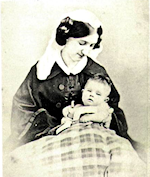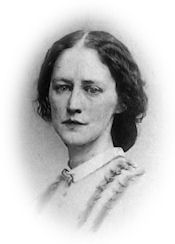August, ‘61.
Dear Girls: Did you give the company captains my little books by Ordronneaux? If not, please do so. They have much useful advice, and as each captain ought to be the father of his company, and look after its welfare in every respect, some such little manual might be useful to them.
In regard to your enquiry about sending the Tribune and Independent to the hospitals regularly from the publication office, I would say that I have already so ordered 10 copies of the Independent sent every week for the coming three months, beginning with this week’s issue. It is prepaid and will be delivered free by Adams Express at the hospital. Charlie has gone down this morning to order the Semiweekly World or Tribune sent in the same way. . . You will receive 12 Independents which he has put up for the Columbia or any other hospital, and some packages for the chaplain of the 16th. . . .
The young men of the New York Christian Association who have been in Washington and Alexandria making the rounds of the hospitals, writing letters for the men and ministering generally, send word that they have never known a single chaplain of any regiment present himself to enquire for his sick or wounded, that there is no resident chaplain, and no one at hand to read or pray for a dying man, or to conduct the funeral services of the dead in the city hospitals. This must be especially the case with the Alexandria hospital—for in that town hardly any clergymen are left. . . . It would be encouraging to know that somebody was detailed in each hospital for special chaplain’s duty. Cannot some arrangement be made? . . .
You must tell us something more about the men of the 16th. . . . How do they cook their food and how is it distributed? Is the camp kept drained and clean? What do the men sleep on? Have they chances for bathing, washing clothes, etc.? . . . Two-thirds of the New York regiments as examined by the Sanitary Commission are crowded too many in a tent—regardless of ventilation—and liable next month to some terrible pestilence. The only sign, so far, that I can see of God’s mercy and the justice of our cause, is the absence as yet of any serious epidemic. . . . But as carelessness, bad habits, hot weather, etc., only sow seeds of sickness to ripen in autumn, we may yet have that plague too, overtake us.

Abby’s informant was right. Up to this time there were no special chaplains in the Washington and Alexandria hospitals. G. and E. felt the need and wrote of it to Abby, who answers as follows:

August, ‘61.
I think that the best you can do is to make your own private arrangement for missionary work two days a week, say, in the Columbia College and two in the Alexandria hospital. I mention these because I suppose they are the two you would be likely to have best access to, and where your suggestions would be best received. You would have to do it with the consent of, or knowledge of, the head physician, superintendent, or whatever Cerberus it is who guards the portals. . . . You need not wait to find out what anybody else is doing. You have a grand scheme on hand for making the hospitals military posts and so entitled to chaplains, but I hardly think you will succeed. . . .
Shall I not apply to Professor Smith for information about a graduate of Union Theological Seminary who would be glad of such an appointment and who has qualifications for such special missionary work?—some one who could be set to work at once, under the “young men’s” auspices or your private patronage, and afterward get a government commission if such are granted. . . .
How strange some of the statements in Russel’s last letter are! That there was no hand to hand fighting at Bull Run. No batteries charged and taken by the Federalists. No masked batteries at all on the side of the rebels, etc., and then that horrid, insulting, false editorial from the London Times in yesterday’s Tribune! I am sure that is aiding and abetting our enemies if anything is, and Russell as the representative of such a paper ought not to be allowed within our lines again. . . .
Do you two ever refresh yourselves by a drive out into the country—for pleasure purely,—with your thoughts so busy always?

Eliza, following up the Hospital Chaplain plan, wrote to General Van Rensselaer, of General Scott’s staff and received the following note:

Headquarters of the Army,…….
Washington, Aug. , 1861.
My dear Mrs. Howland: If you will send me the names of the persons you want appointed to act as Chaplains for the Hospitals, I will get the Lieutenant-General to give them (not a regular commission) but an authority to visit and have free access to the Hospital at all times.
This will invest with full authority, but no rank or emolument.
Yours very truly,
H. Van Rensselaer.
 Georgeanna, also wrote a private letter to President Lincoln asking that Hospital Chaplains should be appointed and handed it in herself at the back door of the White House; and, acting upon Abby’s idea, E. wrote Prof. H. B. Smith of the Union Theological Seminary, asking him to suggest the right person, and soon received the following answer:
Georgeanna, also wrote a private letter to President Lincoln asking that Hospital Chaplains should be appointed and handed it in herself at the back door of the White House; and, acting upon Abby’s idea, E. wrote Prof. H. B. Smith of the Union Theological Seminary, asking him to suggest the right person, and soon received the following answer:

. . I hope I have found the right man. Young Hopkins, son of President Mark Hopkins of Williams College, has just been in, and will think of it. If he can and will accept, he is as near being just the man as need be. He is not ordained, but I suppose can be, if necessary. Will you write me, if it is so? He is a Christian gentleman, every way, and a very able man intellectually. If you think well of him, and he agrees, when shall he come? Please write soon.
I have the most entire confidence in Mr. Hopkins’ discretion and courtesy. He does not seek mere position, he only wants to do good.
Yours truly,
H. B. Smith.

Mr. Henry Hopkins took the position, to our great and lasting pleasure, and the friendship so begun has remained one of the best things the war brought to us.
 When he sent up his letter of introduction from Professor Smith to a and E. in Washington, he expected to be descended upon in the Ebbitt House parlor by two elderly women all ready to superintend him. A year later he wrote to Georgeanna. in acknowledging her photograph, “ It is the very identical countenance which demolished so delightfully my ideal Miss Woolsey with iron grey curls, black silk dress and spectacle-case.”
When he sent up his letter of introduction from Professor Smith to a and E. in Washington, he expected to be descended upon in the Ebbitt House parlor by two elderly women all ready to superintend him. A year later he wrote to Georgeanna. in acknowledging her photograph, “ It is the very identical countenance which demolished so delightfully my ideal Miss Woolsey with iron grey curls, black silk dress and spectacle-case.”
 Mr. Hopkins did most admirable work in the voluntary unofficial position he consented to occupy at first. Later, wishing a more formal connection with the army service, he secured proper official recognition in the General Hospital, and still later he accepted an appointment in the field as regimental Chaplain.
Mr. Hopkins did most admirable work in the voluntary unofficial position he consented to occupy at first. Later, wishing a more formal connection with the army service, he secured proper official recognition in the General Hospital, and still later he accepted an appointment in the field as regimental Chaplain.
![]()






